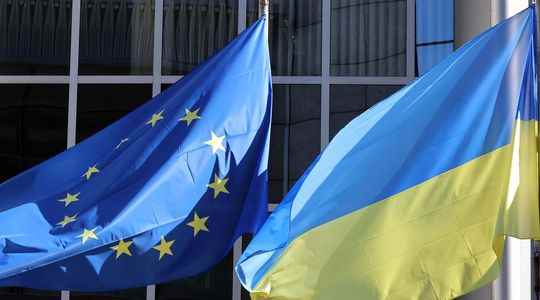“Stop Putin’s oil.” The luminous letters surround a gigantic peace sign deployed on the Schuman roundabout, just in front of the European Council building, in Brussels. An action to relay the petition signed by more than 1 million people, who demand an immediate embargo on Russian hydrocarbons. Admittedly, the activists packed up before the arrival of the 27 European leaders and US President Joe Biden, but their message will resonate over the high-level discussions scheduled for Thursday in the Belgian capital. Face-to-face summits of the G7, NATO and the European Union: the sequence is unprecedented.
It has already been more than two weeks since the United States announced that they would do without Russian oil and gas. The Europeans – much more dependent – do not manage to take the plunge. Gas from Moscow represents more than 45% of their imports, oil more than 25%. “We have chosen not to intervene militarily, but when we see the tragedy of Mariupol, we must put maximum pressure”, argues MEP Nathalie Loiseau. The former Minister for European Affairs is openly campaigning for an oil embargo, which is easier to implement because the market is more diversified.
Germany is reluctant
The countries bordering Russia, the Baltic States or Poland, are calling for strong gestures. France, bound by its role as President of the Council of the European Union, slips that it could act, but that there is an issue of solidarity between the Twenty-Seven. In reality, Germany is still reluctant to give up its deliveries. “To do so overnight would plunge our country and all of Europe into recession,” warned Olaf Scholz before the Bundestag on Wednesday. “Sanctions must not hit European states harder than Russian leaders,” continued the German Chancellor. He is not the only one. “It would represent a disproportionate and almost unbearable burden for Hungary. We will defend the security of our supplies,” added Hungarian Prime Minister Viktor Orban in a video posted on Twitter.
Differences of views
These differences of opinion between Europeans seem, at this stage, paralyzing. “There is a real desire to keep the unity, so we will agree on who is acceptable to everyone”, recognizes a European source. But behind the scenes, Westerners will still think about what to do next. The American president is traveling to Brussels with the firm intention of putting pressure on his partners. “It will be an opportunity for him to realize the diversity of points of view in the EU”, anticipates a senior European official. “New sanctions are not on the agenda, but scenarios must be prepared. We are not on the bone, we are integrating the possibility that in the event of an escalation, more must be done. Everything in his time”, deciphers an adviser to the Elysée. If the Russian president uses chemical weapons, if Belarus enters the war or if kyiv is heavily bombed, we must be able to react with new measures affecting hydrocarbons.
Beware of “every man for himself”
Preparations to reduce dependencies as quickly as possible are therefore well underway, even if the Twenty-Seven have not managed to agree on a date. European leaders will find several proposals on the table this weekend. The European Commission proposes that they fill their gas reserves to 90% for next winter. To avoid driving up prices further, Brussels is advocating group purchases, as was done for vaccines against Covid. “We need a collective attitude. Some countries have started to sign bilateral contracts, regrets a source in the entourage of the President of the Republic. Our concern is not to see the beginnings of the Covid crisis again. A veiled accusation of “every man for himself” which targets Germany. Vice-Chancellor Robert Habeck indeed went to Qatar this week to buy liquefied natural gas.
